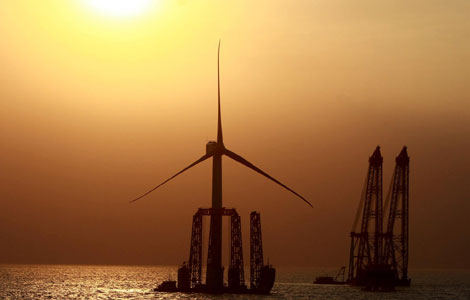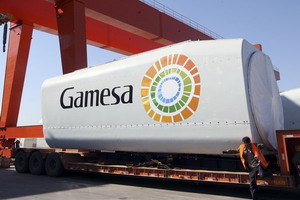More Chinese ODI urged
Updated: 2011-09-08 09:11
By Ding Qingfen, Tang Zhihao and Wei Tian (China Daily)
|
|||||||||||
XIAMEN, Fujian province - A larger outflow of Chinese overseas direct investment (ODI) could help the global economy regain and sustain its growth momentum, even as uncertainties remain over the strength of the global recovery, said officials from both China and overseas.
"The deeper impact of the global financial crisis has expanded, and new uncertainties about the world economic recovery constantly appear," said Chen Deming, the Chinese minister of commerce, at the opening ceremony of the 15th China International Fair for Investment & Trade (CIFIT) on Sept 7.
"The enhancement of international cooperation and encouragement and support for Chinese ODI would be an effective way of adding vigor to the global economy and help to achieve robust, sustainable and balanced growth," said Chen.
Held in Xiamen, the five-day investment fair has attracted 636 international organizations and 482 high-profile visitors from foreign governments, companies and institutions.
Also on Sept 7, three Chinese ministries, including the Ministry of Commerce, released the 2011 industrial guidelines on China's Overseas Investment. The guidelines, which have been renewed annually since 2009, cover 115 foreign countries and include detailed regulations and information about each nation. The aim is to help Chinese companies invest in a more sustainable way, according to a statement on the commerce ministry website.
On Sept 6, the United Nations Conference on Trade and Development predicted that 2011 global economic growth would decline to 3.1 percent from 3.9 percent in 2010. Growth for the United States is predicted to be 2.3 percent, for the European Union it is 1.9 percent, while for Japan the figure is minus 0.4 percent. Meanwhile, Chinese growth is seen at 9.4 percent, while the figure is 8.1 percent for India.
While the global economy is troubled by debt crises and speculation abounds concerning a double-dip recession, Chinese investment is becoming increasingly important for the world. Participants at CIFIT welcomed the investment, believing that it may boost economic growth.
Bilateral trade between China and India is expected to reach $100 billion by 2015 from $62 billion in 2010, but "we also expect to increase the investment. We expect to attract Chinese companies to invest in India," said Indra Mani Pandey of the Indian Consulate General.
Pandey said Chinese companies are welcome to invest in sectors such as infrastructure, automobiles, energy and machine making.
This is the first time that India attended the fair. "CIFIT is an important platform for India to seek opportunities for cooperation with Chinese companies," Pandey said.
"Many of them (the companies) do not know the investment environment and how to benefit from it. We have to convince them that we have the technological manpower and a vast consumer market."
Wang Shengwen, deputy director-general of the Department of Outward Investment and Economic Cooperation at the Ministry of Commerce, said that the growing debt crises will provide Chinese companies with a great number of foreign investment opportunities during the next two decades.
"Developed regions, including the US and the European Union, Australia and emerging markets" very much welcome China's investment, said Wang.
"We expect to see more investment from China, because Algeria is the largest market in Africa by population," said Safia Kouiret, assistant to the director-general of the Algerian Ministry of Industry and Investment Promotion.
Algeria plans to allocate $286 billion to attract overseas investment in a number of projects, including the construction of highways, schools, medical centers and airports. "Chinese investment is very important for us and our experience as a growing economy during the past three decades" needs to be understood, Kouiret said.
Together with countries such as Sudan, Algeria is a top African destination for Chinese overseas investment. "Chinese investment means discipline, quality and an interesting price," she said.
It's not only about emerging markets, as those from developed economies have also voiced their enthusiasm.
"If Chinese companies invest in Lithuania, they are investing in the European market. This is our value to Chinese companies," said Rimantas Zylius, economy minister of the Republic of Lithuania.
"The Chinese economy is ready to go outside, we believe we can benefit from China," he said, adding that Chinese companies are welcome to invest in high-tech industries such as pharmaceuticals.
While the developed economies have expressed an interest in Chinese investment, they have also set up barriers in some cases.
However, according to Zylius: "What is important is that China is opening up and European countries are investing in China. It is important that Chinese companies get the same treatment in Europe as European companies receive in China."
In 2010, China overtook Japan and the United Kingdom to become the world's fifth-largest overseas investing nation as the volume of investment surged by 21.7 percent to $68.8 billion.
Regions including Oceania and EU have witnessed the most rapid investment growth in the past few years, although the Asia-Pacific region and Latin America are the top two in absorbing Chinese investment by volume.
As "the biggest construction site in Europe, Poland will see record Chinese investment this year", despite initial failures, said Andrzej Pieczonka, first counsellor at the Polish Consulate General in Shanghai.
Li Jiabao contributed to this story.
Related Stories
Crisis creating ODI opportunities 2011-09-07 14:03
China's ODI up 21.7% to $68.81b in 2010 2011-09-06 17:24
August ODI rebounds after July decline 2011-09-01 09:15
Economists warn of double-dip 2011-08-26 08:03
- China central bank may launch RMB QFII trials soon
- China to further facilitate investment
- Apple closer to offering 3G iPad 2 in mainland
- Call for stronger trade ties
- Provinces to face winter power shortages
- Investment to fertilize forests
- Fair opens doors to more opportunities
- 360buy.com plans $4b-$5b US IPO













